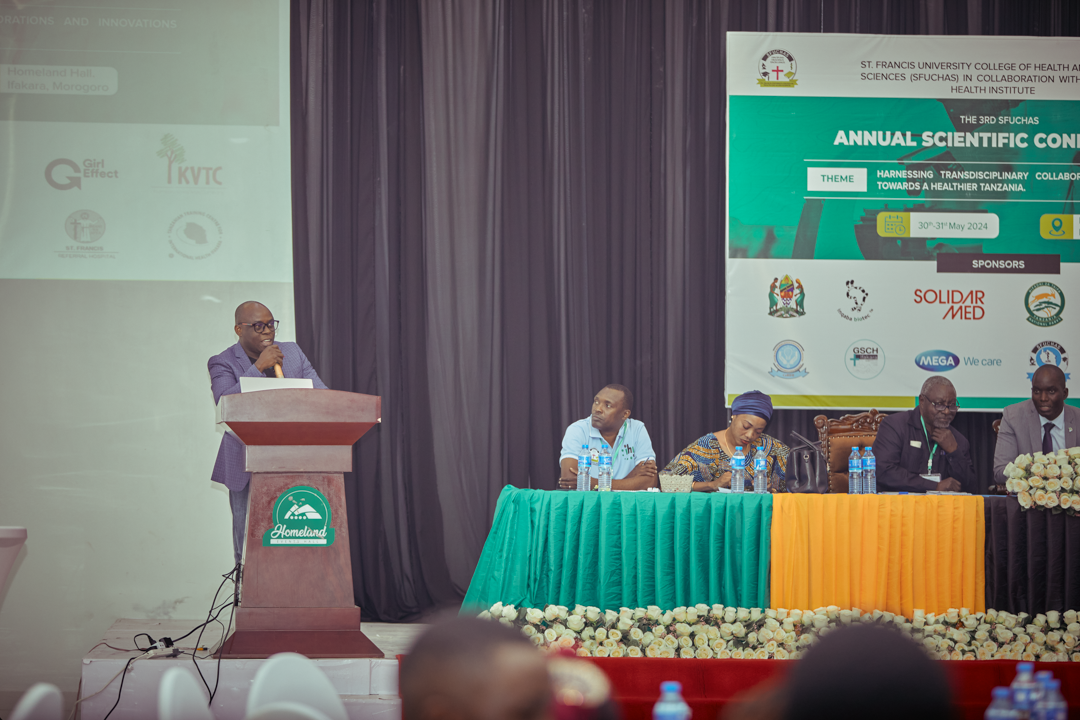
#ASC2024: Ifakara, partners host joint conference on public health

Today, the SFUCHAS Conference jointly organized by Ifakara Health Institute and partners kickstarts in Ifakara, bringing together researchers, students, health practitioners, policymakers, and community stakeholders.
The scientific conference's theme is "Harnessing Transdisciplinary Collaborations and Innovations Towards a Healthier Tanzania," which aims to promote transdisciplinary collaborations and innovative solutions to tackle pressing health challenges in Tanzania.
Sub-themes include health promotion and disease prevention, quality healthcare, vaccine and drug development, digital health and artificial intelligence, implementation sciences and health system strengthening, and planetary health.
DC graces opening ceremony
The Kilombero District Commissioner, Dunstan Kyobya, is chief guest. In his opening remarks, he applauded Ifakara, SFUCHAS, and St. Francis Regional Referral Hospital (SFRRH) for their outstanding contributions to scientific research and their innovative solutions addressing community health challenges.
”Innovation in technology is key to advancing public health in our communities. I applaud the efforts in finding solutions to challenges occurring in our communities such as malaria which has affected Kilombero immensely over the years," he emphasized.
The DC was also given a tour of the exhibition booth at the conference, learning firsthand about the diverse innovative research endeavors and healthcare solutions offered by Ifakara, SFUCHAS, and partnering organizations such as Solidar Med and Good Samaritan Cancer Hospital.
Insights from conference presentations
The conference proceeded with oral presentations by research scientists from Ifakara and students from SFUCHAS, covering various topics related to the conference’s sub-themes.
From Naomi Urio's presentation on the effects of agricultural pesticides on malaria vectors in rural southeastern Tanzania, to Dr. Halfani Ngowi's discussion on using state-space population dynamics models to understand the ecology of Anopheles funestus, a major malaria vector in Tanzania, their studies underscore the role of environmental and ecological factors in influencing malaria transmission, and the need to consider integrating these factors into vector control strategies.
Dr. Lina Finda, a senior scientist from Ifakara, also shared study findings on the adaptation of gene drive technology, currently under discussion among African stakeholders. Dr. Lina, who leads the Gene Drive project, highlighted key insights and recommendations from discussions with African stakeholders regarding the potential of alternative strategies for malaria control.
Contributions from more scientists like Hamisi Kunambi also offer innovative solutions, such as the potential of sterilized malaria vectors to auto-disseminate insecticides to breeding habitats, while Yohana Mwalugelo presented on the impact of livestock husbandry practices on malaria transmission risks within rural southeastern Tanzania.
SFUCHAS students lead dialogues on disease prevention
During another session, SFUCHAS students delivered additional oral presentations focusing on health promotion and disease prevention, including the provision of high-quality health services.
The students addressed crucial topics such as the problem of antimicrobial resistance and its associated risk factors, strategies to improve the quality of life for chronic kidney disease patients, and the clinical epidemiology of cervical cancer. Additionally, two further studies were presented: one examining the challenges of compliance with infection prevention and control (IPC) standards, and another detailing a case report of bilateral congenital malformation of inverted breast nipples.
Moreover, participants got to hear an inspiring testimonial from Soldar Med, highlighting the successful utilization of a Mobile Health Clinic (Van) to provide healthcare services to children under five in remote communities within the Malinyi District.
Innovative approaches to improve Tanzania's health landscape
In the latter sessions of the conference's first day, attendees engaged in a panel discussion led by distinguished health experts. The panel included Dr. Lina Finda from Ifakara, Dr. Eliaza Mkuna, and SFUCHAS Principal Prof. Festus Kalokola.
The discussion centered on the implementation of transdisciplinary and innovative approaches to enhance Tanzania's health landscape. Moderated by George Sigalla, the panelists provided valuable insights on how the nation can effectively bridge both public and private sectors to promote holistic well-being.
Following this, a "skills building session" was conducted by Albino Kalolo, focusing on comprehensive strategies for combating predatory publishing. Kalolo offered practical recommendations to researchers and aspiring scholars on safeguarding scholarly integrity.
To conclude the day's proceedings, Robert Machang’u and colleagues from SFUCHAS delivered a special presentation on leprosy management. Providing a historical overview spanning over 100 years, the presentation shed light on the evolving trends of leprosy in Tanzania.
Continuing the dialogue on public health
Day two of the conference featured four scientific sessions covering planetary health, digital health and artificial Intelligence, implementation science, economics, and health system strengthening, as well as vaccine and drug development.
From a presentation by SolidarMed outlining their initiatives for achieving climate neutrality to a presentation by Jamari Siri of SFUCHAS, who shared insights from a clinical trial exploring hypertension treatment adherence, and Ally Mwambela, a SFUCHAS student, who addressed antimicrobial resistance in Africa and its correlation with climate and stewardship factors to Godfrey Katusi of Ifakara Health Institute discussing the impact of climate-adapted rice cultivation on malaria vectors, these sessions collectively offered insightful perspectives into addressing health challenges.
Other presenters delved into various topics such as SFUCHAS Prof. Senga Pemba's analysis of integrating remote consultations into healthcare, and Girls Effect's examination of girls’ mobile technology usage and the associated challenges. Abbas Skyes from Ifakara Innovation Hub provided valuable insights into health innovation, illustrating how the Hub supports local startups in developing innovative solutions for community health challenges.
Insights from the CDCI team on HIV management
The CDCI team at Ifakara Health Institute also delivered presentations centered on HIV management, providing valuable insights into improving healthcare outcomes for people living with HIV (PLHIV) in rural settings.
Lulu Wilson's study focused on understanding viral rebound and its associated risk factors among PLHIV who have achieved viral suppression while Franzisca Alfred's research delved into the impact of different antiretroviral therapy (ART) regimens on weight change trajectories among ART-naïve participants. Additionally, Dr. Ezekiel Luoga's work highlighted trends in advanced HIV disease, mortality, and loss of follow-up among adults living with HIV in the Kilombero and Ulanga regions.
Click here for more photos from the conference.
